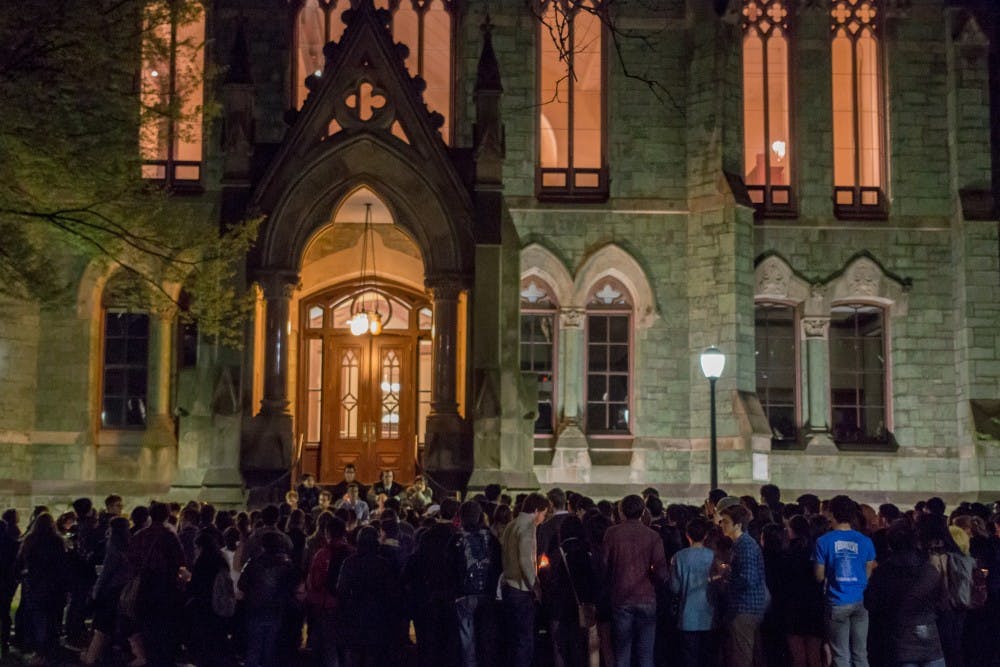Following Wharton junior Olivia Kong's death by suicide in 2016, Penn reconvened a Task Force on Student Psychological Health and Welfare. The task force concluded its work about a year ago but has not released any public report on its findings or offered any recommendations that directly sparked policy changes.
This is because the goals of this task force were different from those of the first one, which convened in February 2014 and concluded its work a year later. This earlier task force was explicitly charged with researching the state of mental health on campus and making recommendations for improvement.
The reconvened task force, on the other hand, was designed to review ongoing progress, and was not charged with compiling a public report. Members of the task force concluded a few months after it had reconvened that ongoing mental health initiatives — expansion of I CARE training, the Wellness Ambassadors program and increased Counseling and Psychological Services hours, to name a few — were adequately addressing the issue.
“The charge to the task force when it reconvened did not include a charge to release a public report and, that, in a nutshell was why there was no report,” said Executive Director for Education and Academic Planning Rob Nelson who staffed both task forces.
“The Task Force completed its work at the end of the summer of 2016, so we have nothing new to say,” wrote English professor Rebecca Bushnell in an email. Bushnell, along with Medical School Psychiatry professor Anthony Rostain headed the reconvened task force.

Fourteen Penn students have died by suicide since 2013. Throughout this period, Penn's administration has struggled to address the mental health of students — an issue that’s sparked grave concern from across the Penn community as well as several bouts of student activism.
The issue has earned renewed attention over the last few weeks after the death of College senior Nicholas Moya, who died off campus Aug. 31, just two days after the first day of classes.
CAMPUS RESOURCES
The HELP Line: 215-898-HELP
Counseling and Psychological Services: 215-898-7021 (is active 24/7)
University Chaplain’s Office: 215-898-8456
Student Health Service: 215-746-3535
Office of the Vice Provost for University Life: 215-898-6081
Reach-A-Peer Helpline: 215-573-2727 (helpline available every night from 9 p.m. to 1 a.m.) | 215-515-7332 (texting service available 24/7) | Letter-writing service
Administrators have not said whether Moya's death will prompt any concrete policy changes.
“Delivering, assessing, and expanding mental health services and support have been, and remain, top priority in VPUL," University spokesperson Monica Yant Kinney wrote in an email. “Staff in many departments — CAPS, Student Intervention Services, Student Health Service, OFSL, and other offices outside of VPUL such as the Chaplain’s Office — have been working around the clock to support students impacted by the recent death of their classmate.”
After the task force reconvened in April 2016, it met a number of times throughout the summer of 2016 before concluding its work in fall of 2016. Like the first iteration of the task force, students were not included because the work occurred over the summer and certain aspects of the discussion were deemed too sensitive, administrators said.
“My sense was that this was a little more of a targeted task force, versus the first one, which was exploratory,” said CAPS Director of Outreach and Prevention Meeta Kumar.
One of the only direct changes that stemmed from the aftermath of Kong’s death in 2016 was a new system for communicating student deaths to the Penn community. Previously, certain groups of students would be notified by their dean depending on the situation. Now, all undergraduate students receive a singular message from the Vice Provost for University Life’s office when an undergraduate dies.
This policy is slightly different when applied to graduate students. Only the community in the student's home school is emailed; University Communications then proactively forwards that email to The Daily Pennsylvanian. Following the death of Penn Vet student Brett Cooper last week, the University notified Penn Vet students in an email and forwarded the email to the DP.
Four Penn students have died this year, two of whom are confirmed to have died by suicide. Aran Rana, who was a College sophomore, died by suicide in Hong Kong while on a leave of absence in February. The cause of Cooper's death is still unknown.
The University's task force concluded after Kong's 2016 death that Penn’s wide array of ongoing mental health initiatives are sufficient to address the issue. It's unclear if this is still their position following the deaths of Moya and Rana.



